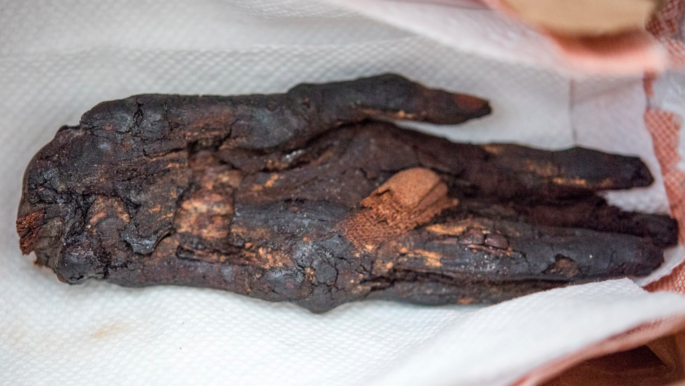Operation 'Mummy's Curse' sees ancient Egyptian relics repatriated
The return of the relics are part and parcel of an operation conducted by ICE titled "Operation Mummy's Curse" and follows the repatriation of artefacts to Egypt in recent years by US authorities.
The US has repatriated 80 items including a nesting sarcophagus found in a Brooklyn garage, a funerary boat model, ancient coins, and a series of finely carved limestone reliefs from an Egyptian temple returned to the Land of the Pharaohs since 2007.
Invaluable ancient relics
"Each of the artifacts returned today tells a story - a human story, our story. History comes alive when someone is able to not only read about the past, but is also able to visit the historical sites, watch and enjoy the artifacts, appreciate the images and see the actual writings of our ancestors," said Foreign Minister Shoukry, speaking at a ceremony at the Egyptian embassy in Washington this week.
To date Operation Mummy's Curse has conducted 16 seizures locating ancient artefacts worth approximately $3 million.
Twitter Post
|
Other work conducted by the ICE in recent years has seen agents retrieve paintings from France, Germany, Poland and Austria. Meanwhile 15th-18th century manuscripts from Italy and Peru, cultural artifacts from China and Cambodia, two dinosaur fossils to Mongolia, antiquities and Saddam Hussein-era objects have all repatriated.
Together Operations Mummy's Curse and Mummy's Claw have helped US authorities identify a complex and multifaceted criminal network able to bypass border officials, according to ICE director Sarah Saldana.
"While we recognise that cultural property, art and antiquities are assigned a dollar value in the marketplace, the cultural and symbolic worth of these Egyptian treasures far surpasses any monetary value to the people of Egypt," Saldana said this week speaking in Washington.
Earlier this year France repatriated 44 artefacts to Egypt including a limestone busk of a woman, Coptic crosses, and wooden hand clappers used as percussive instruments.
Since the start of 2015 items have also been repatriated from countries including Belgium, Germany, Switzerland, Israel and the UK.
 |
In my opinion, Sisi is really Mentuhotep II ... You need to understand what happened 4,000 years ago to understand what is happening now Zabi Hawass, former Egyptian Antiquities minister |
 |
Sisi, the new Mentuhotep II?
Last year, Zabi Hawass, the former head of the Egyptian ministry of antiquities under Hosni Mubarak, claimed that thousands of artefacts had been looted from Egyptian museums and heritage locations during the 2011 revolution.
Further seizures occurred during the turmoil of the 2013 military coup that saw President Mohamed Morsi deposed of power by current President Abdul Fattah al-Sisi.
"Everyone started to excavate illegally," said Hawass, speaking at the time.
 |
| A recovered mummy's hand was being used as a science-fiction movie prop [Screengrab from Twitter] |
The vociferous Hawass has compared the current Egyptian president's rise to power - during a tumultuous period in Egypt that saw authorities fire on protestors in events condemned by rights groups - to the rise to power of the pharaoh Mentuhotep II in Egypt over 4,000 years ago.
"We need an elected officer – a strong man - to control the country. And in my opinion, Sisi is our only hope."
The Egyptian ministry of antiquities announced in January that it was developing a new digital database in order to fight racketeering and help recover and identify smuggled artefacts.
It worked with staff from the British Museum who trained Egyptian officials in the digitisation process.
Specialists from the American Research Center in Egypt are also involved in the process.





 Follow the Middle East's top stories in English at The New Arab on Google News
Follow the Middle East's top stories in English at The New Arab on Google News


